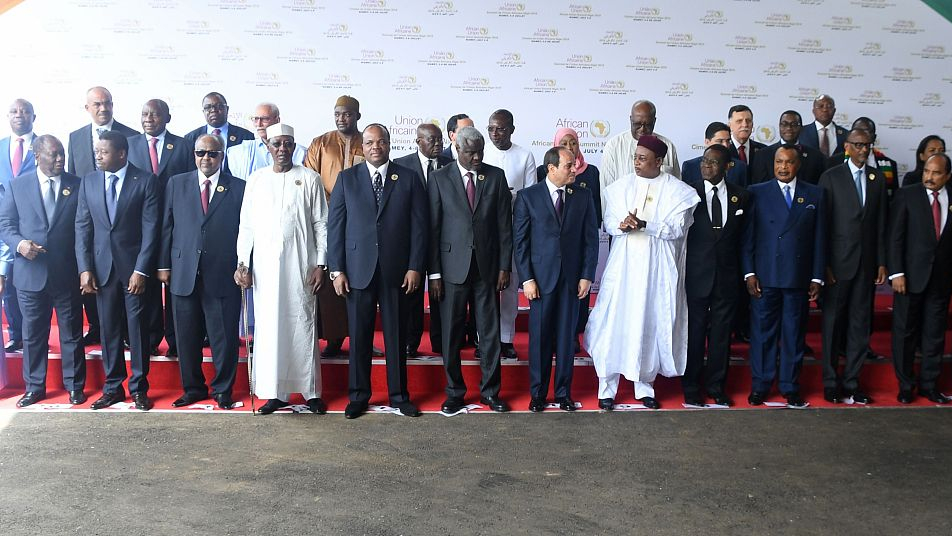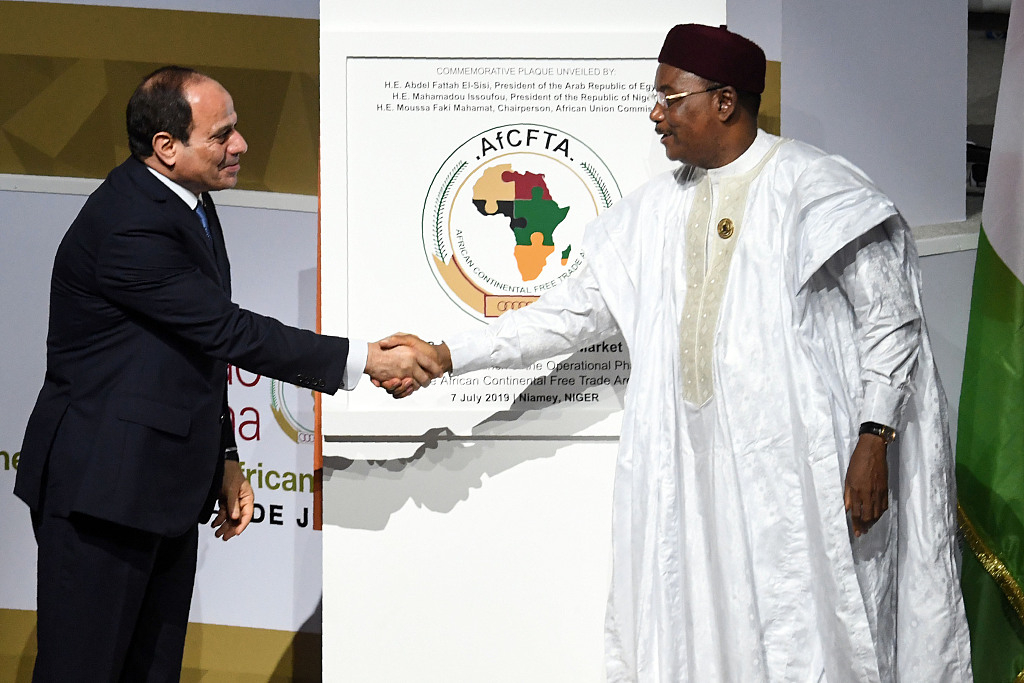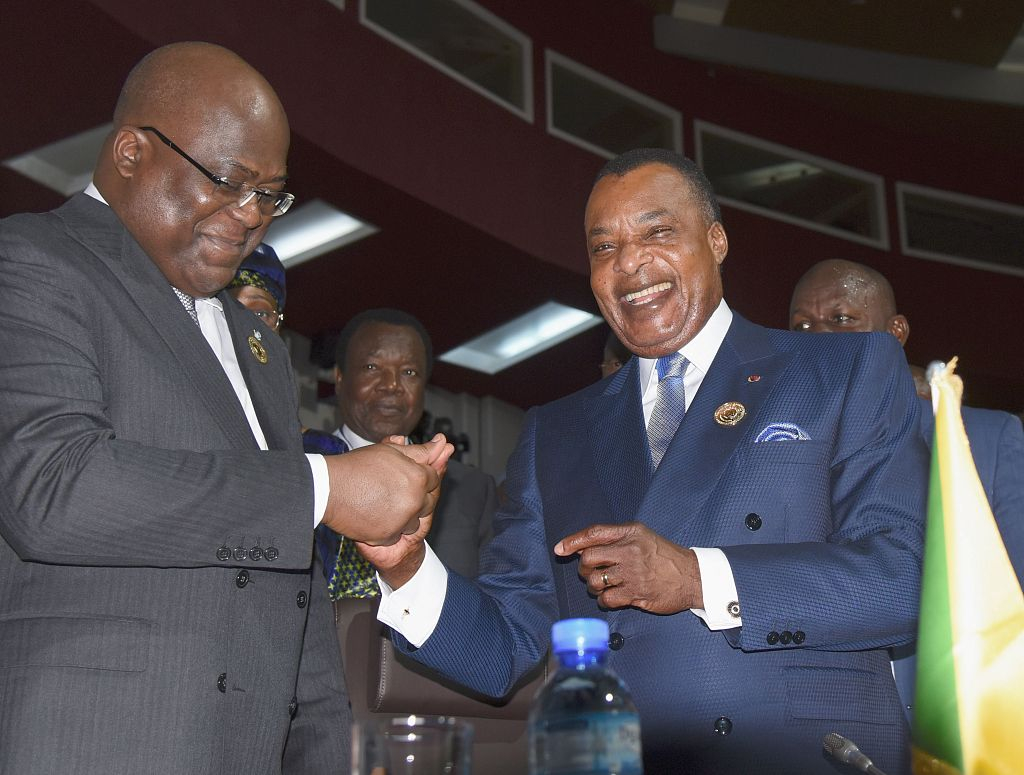

Editor's note: Andrew Korybko is a Moscow-based American political analyst. The article reflects the author's opinions and not necessarily the views of CGTN.
The long-awaited African Continental Free Trade Area (AfCFTA) was officially launched following a ceremony in the Nigerien capital of Niamey during the two-day African Union's latest summit on July 7. It thus established the world's largest trade bloc of 54 nations, with a population of 1.3 billion, and a combined GDP of approximately 3.4 trillion U.S. dollars.
This is truly an historic moment not only for Africa, but also for the world at large, since it heralds the beginning of the Afro-Pacific era of international relations. This concept is a purely a political evolution of the U.S.' so-called "Indo-Pacific" vision, with both of them building upon their shared Asia-Pacific strategic predecessor.
Instead of limiting the economic scope in a certain region, the Afro-Pacific concept stretches all the way from the eastern shores of Africa to the western ones of South America.
It's more than just rhetoric since China is already Africa's top economic partner with over 200 billion U.S. dollars in trade last year, thereby proving that Asian-African connectivity already exists in practice. AfCFTA will facilitate its further expansion by making it easier for foreign investors to take part in the continent's future development.

Egyptian President and African Union Chairman Abdel Fattah al-Sisi (L) shakes hands with Niger's President Mahamadou Issoufou after the launching of the "operational phase" of a landmark free trade agreement named African Continental Free Trade Area during the African Union summit in Niamey, Niger, July 7, 2019. /VCG Photo
Although some of the finer details have yet to be worked out, AfCFTA's guiding purpose is to enable foreign direct investment (FDI) to more seamlessly spread throughout Africa as a whole. AfCFTA helps its members to take advantage of each country's unique economic role in ways to reap economic benefits.
This will undoubtedly make Africa a more attractive investment destination than ever before. As a result, it will also increase Asian-African trade, which have positive strategic consequences for both sides.
The maritime portion of China's Belt and Road Initiative (BRI) is the basis for intercontinental trade. it is expected that three of its relevant projects will strengthen economic ties between the Asia and Africa even further. The TAZARA railway between Tanzania and Zambia functions as a proto-Silk Road before BRI was ever even conceived, while the Djibouti-Addis Ababa Railway (DAAR) and Kenya's Standard Gauge Railway (SGR) are its modern equivalents in the northern part of the East African region.
These Chinese-constructed megaprojects are therefore slated to play crucial roles in taking Asian-African trade to the next level, which will likely also trigger a demand for more BRI projects in the continent. This all make African countries eager to participate in this community of shared destiny and equitable development that's forming before everyone's eyes.

DR Congo President Felix Tshisekedi (L) shakes hands with Congo's President Denis Sassou Nguesso during the opening ceremony of the African Union summit in Niamey, Niger, July 7, 2019. /VCG Photo
The entire world can utilize China's BRI projects, so unprecedented trade corridors might soon emerge between countries such as Pakistan & Ethiopia, Bangladesh & Kenya, and Myanmar & Tanzania, for example.
The more that Asian and African nations trade with one another via BRI facilitated by AfCFTA, the more that the "Global South's" people will develop in this respect, the Afro-Pacific era could even lead to a period of more peace and prosperity if properly managed by all parties in pursuit of win-win outcomes.
Overall, the official launch of AfCFTA is an event of monumental historic importance because of the likelihood that this will unleash Africa's full developmental potential and lead to even more trade between it and Asia. China's BRI has made it possible for the entire world to tap into this opportunity for the benefit of the African people, which is Beijing's priceless contribution to the Afro-Pacific concept.
As the gap between the "Global South" and the "Golden Billion" becomes narrow due to the socio-economic development that might soon take place, more people in the world will begin to enjoy respectable living standards and the lives they deserve.
(If you want to contribute and have specific expertise, please contact us at opinions@cgtn.com)

Copyright © 2018 CGTN. Beijing ICP prepared NO.16065310-3
Copyright © 2018 CGTN. Beijing ICP prepared NO.16065310-3